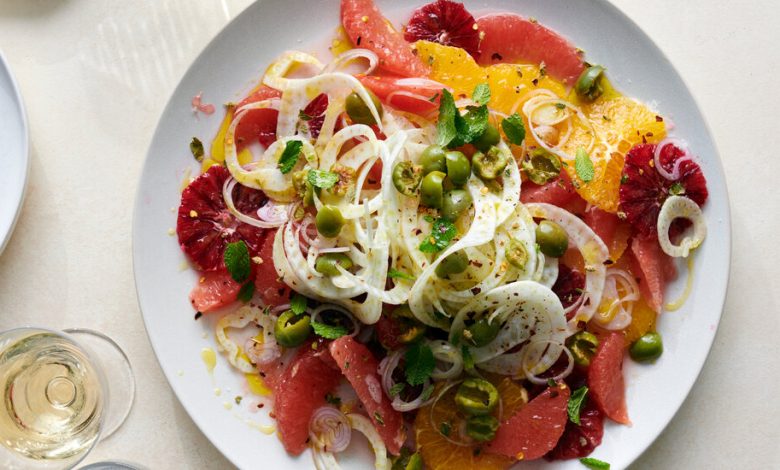A Bright, Bold Citrus Salad Is Just the Start of This Dinner Party Menu

The market report from where I am (Los Angeles): Winter citrus is here, hallelujah. Stalls are piled with mandarins, many with stems and leaves attached. Satsumas are back, easy-peeling and sweet-tart, as are their cousins, the miniature two-bite Kishus, amazing little fruits.
And oranges. Juicy navels are in full swing, and blood oranges — with their flesh and skin the color of a sunset, their red juice almost tropical — have finally arrived.
There’s still so much more: Cara Cara oranges, with their coral interiors; small grapefruits, both ruby and Oro Blanco; kumquats, even mandarinquats; enormous and enchanting pomelos. An assortment of them all would make a dazzling salad, I thought.
An orange salad can be a simple affair, and at its best the ultimate refreshing dish. With a few black olives and a drizzle of extra-virgin olive oil, you have a winning combination, popular in the eastern Mediterranean, southern Italy and perhaps especially Morocco.
You can increase the interest factor in any number of ways. Add thinly sliced fennel and red onion, some arugula, mint or basil leaves, a sprinkling of red pepper, a pinch of wild oregano, a little flaky salt. Make it as fancy or simple as you like. The salad can be just one type of citrus or many.
To follow, I thought back to a few years ago, when I developed a recipe for a hearty baked arborio rice dish. I called it risotto al forno and was soundly reprimanded by my longtime friend, the Italian food expert Faith Willinger. “Don’t call it risotto,” was her terse message. I got it. Only risotto is risotto, stirred lovingly, and it’s meant to be served straight from the pot as soon as it is ready.
And yet, there is a homelier rice dish known to many Italians as riso al forno. Sausage, tomato, cheese and rice in the oven, it’s a weeknight casserole, hardly elegant but very delicious.
I had the idea to marry the two concepts in a fancy make-ahead casserole full of seafood, and was left with very nice results, but I knew better than to call it risotto. I did, however, cook the rice using the classic risotto method, which is not a big deal. It just means standing by the stove and stirring every once in a while, as you slowly sip a glass of wine. The trick is keeping the rice slightly underdone so it won’t become mushy when baked.
I folded a pound of fresh crab meat into the saffron-scented rice — luxurious, certainly — and tucked it all into a baking dish. Then, I topped it with fat shrimp in their shells and showered them with bread crumbs. I may say it was a thing of beauty and worthy of a real celebration. Upon tasting, it seemed a bit paella-ish, yet somehow slightly Creole. Rather than serving it with a hollandaise sauce (for the Creole aspect), I made a little sauce with crème fraîche, Dijon mustard, lemon zest and chives.
For dessert, I drew inspiration from my friend Salvatore Messina, who will bake and bring a cake to a dinner party without skipping a beat. It has happened countless times over the years, to everyone’s delight, and he always makes the same one, an exquisitely tender almond cake with a hint of lemon. Made simply of blanched almonds, eggs and sugar, it’s even gluten free.
I finally wrangled the recipe from him. Since it has some similarity to other Italian almond cakes, I naturally assumed it to be his family’s, passed down from his Sicilian grandmother. But it turned out to have no Italian story line. Sal adapted it from a recipe for torta de Santiago, the traditional almond cake from Galicia, Spain.
Named after Santiago (St. James, St. Jacques, San Giacomo), the cake dates from the Middle Ages, and its original recipe is equal parts almonds, eggs and sugar. Sal’s modern Italianate adaptation has less sugar, more orange zest and no cinnamon. It’s heavenly.
Though it used be known as Sal’s Almond Cake, I now call it Torta Salvatore, a perfect ending to this somewhat decadent menu.
Recipes: Citrus Salad With Fennel and Olives | Riso al Forno With Crab and Shrimp | Almond Spongecake
Follow New York Times Cooking on Instagram, Facebook, YouTube, TikTok and Pinterest. Get regular updates from New York Times Cooking, with recipe suggestions, cooking tips and shopping advice.
